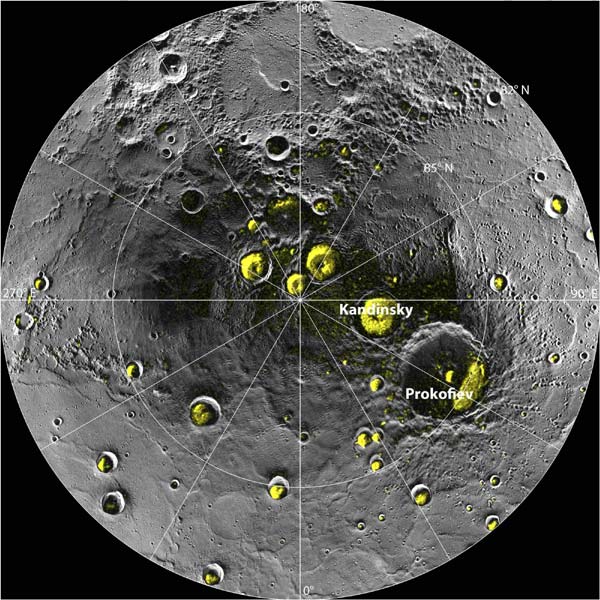NASA probe reveals organics, ice on Mercury
Updated: 2012-11-30 08:03
(Agencies)
|
||||||||
CAPE CANAVERAL, Fla.- Despite searing daytime temperatures, Mercury, the planet closest to the sun, has ice and frozen organic materials inside permanently shadowed craters in its north pole, NASA scientists said on Thursday.
Earth-based telescopes have been compiling evidence for ice on Mercury for 20 years, but the finding of organics was a surprise, say researchers with NASA's MESSENGER spacecraft, the first probe to orbit Mercury.
Both ice and organic materials, which are similar to tar or coal, were believed to have been delivered millions of years ago by comets and asteroids crashing into the planet.
"It's not something we expected to see, but then of course you realize it kind of makes sense because we see this in other places," such as icy bodies in the outer solar system and in the nuclei of comets, planetary scientist David Paige, with the University of California, Los Angeles, told Reuters.
Unlike NASA's Mars rover Curiosity, which will be sampling rocks and soils to look for organic materials directly, the MESSENGER probe bounces laser beams, counts particles, measures gamma rays and collects other data remotely from orbit.
The discoveries of ice and organics, painstakingly pieced together for more than a year, are based on computer models, laboratory experiments and deduction, not direct analysis.
"The explanation that seems to fit all the data is that it's organic material," said lead MESSENGER scientist Sean Solomon, with Columbia University in New York.
Added Paige, "It's not just a crazy hypothesis. No one has got anything else that seems to fit all the observations better."
Scientists believe the organic material, which is about twice as dark as most of Mercury's surface, was mixed in with comet- or asteroid-delivered ice eons ago.
The ice vaporized, then re-solidified where it was colder, leaving dark deposits on the surface. Radar imagery shows the dark patches subside at the coldest parts of the crater, where ice can exist on the surface.
The areas where the dark patches are seen are not cold enough for surface ice without the overlying layer of what is believed to be organics.
So remote was the idea of organics on Mercury that MESSENGER got a relatively easy pass by NASA's planetary protection protocols that were established to minimize the chance of contaminating any indigenous life-potential material with hitchhiking microbes from Earth.
Scientists don't believe Mercury is or was suitable for ancient life, but the discovery of organics on an inner planet of the solar system may shed light on how life got started on Earth and how life may evolve on planets beyond the solar system.
"Finding a place in the inner solar system where some of these same ingredients that may have led to life on Earth are preserved for us is really exciting," Paige said.
MESSENGER, which stands for Mercury Surface, Space Environment, Geochemistry and Ranging, is due to complete its two-year mission at Mercury in March.
Scientists are seeking NASA funding to continue operations for at least part of a third year. The probe will remain in Mercury's orbit until the planet's gravity eventually causes it to crash onto the surface.
Whether the discovery of organics now prompts NASA to select a crash zone rather than leave it up to chance remains to be seen. Microbes that may have hitched a ride on MESSENGER likely have been killed off by the harsh radiation environment at Mercury.
The research is published in this week's edition of the journal Science.

 Relief reaches isolated village
Relief reaches isolated village
 Rainfall poses new threats to quake-hit region
Rainfall poses new threats to quake-hit region
 Funerals begin for Boston bombing victims
Funerals begin for Boston bombing victims
 Quake takeaway from China's Air Force
Quake takeaway from China's Air Force
 Obama celebrates young inventors at science fair
Obama celebrates young inventors at science fair
 Earth Day marked around the world
Earth Day marked around the world
 Volunteer team helping students find sense of normalcy
Volunteer team helping students find sense of normalcy
 Ethnic groups quick to join rescue efforts
Ethnic groups quick to join rescue efforts
Most Viewed
Editor's Picks

|

|

|

|

|

|
Today's Top News
Health new priority for quake zone
Xi meets US top military officer
Japan's boats driven out of Diaoyu
China mulls online shopping legislation
Bird flu death toll rises to 22
Putin appoints new ambassador to China
Japanese ships blocked from Diaoyu Islands
Inspired by Guan, more Chinese pick up golf
US Weekly

|

|








